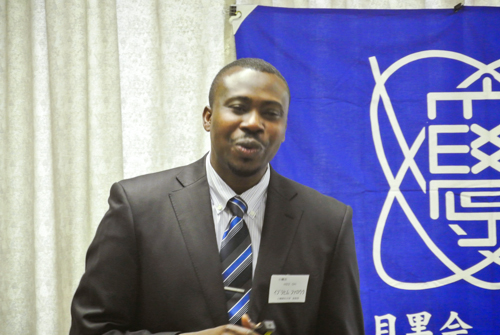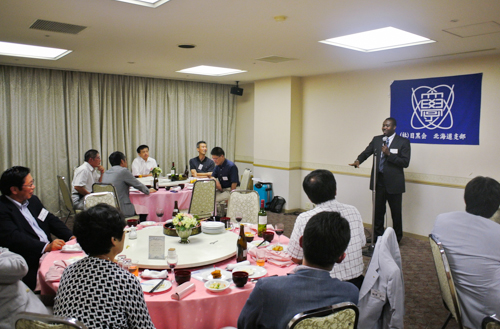September 2014 Issue
Topics
Letter From Alumni

I received my masters and doctoral degrees from the University of Electro-Communications (UEC) where I studied between 2005 and 2010. My supervisor was Professor Watanabe Shigeyoshi whose research spans over the fields of Software Engineering, Multi-Agent Systems and e-Learning.
I came to Japan on a Japanese Monbukagakusho scholarship in 2005. At that time, e-Learning was not common in Ghana because of low Internet penetration. What was familiar to Ghanaians was "Distance Education." In the Ghanaian context, it was the delivery of education through radio, television, audio/video cassette and CD. The knowledge of Multi-Agent systems was also not common, as in many parts of the world. Therefore, my intention was to study software engineering. This was because, after receiving my bachelor's degree in computer science in Ghana in 2000, I had worked for about five years in the field of ICT, mainly on distributed systems. My first job was IT consultant with an Oracle partner company that was executing a national project which aimed at implementing the then newly created Ghana national salary scheme on Oracle payroll system. The project was sponsored by the International Monetary Fund and the Department for International Development. I had also worked in a state organization that was responsible for paying pension benefits and student loans to all Ghanaian pensioners and university students respectively. In my capacity as a senior system analyst and programmer, I was involved in developing the in-house systems that were used through Intranets by almost all the branch offices in Ghana.
However, at my first meeting with Professor Watanabe Shigeyoshi he suggested that I participate in all the seminars that were organized by the three research groups in his laboratory before I make a final decision regarding my research path. His suggestion was a great opportunity for me because it motivated me to study more about all the three research fields. But, what actually affected my decision was my continuous thought about how my choice could positively impact the development of my country, since that was the main goal of the scholarship. Additionally, I was impressed by the Japanese technological and economic advancement that has been propelled by education. This impression reminded me that, if education becomes available to as many Africans as possible, Africa would be liberated from the challenges that it faces in this century. Indeed, it is only e-Learning that could facilitate the delivery of education to the remotest parts of Africa.
Therefore, I narrowed my choice to e-Learning and, after I made my decision known to my professor, he motivated me by supplying me with many books and articles related to e-Learning research. It was a great honor for me to conduct my research in his laboratory. I recollect his kind smiles and critical supervision. My research has focused on CSCL, ITS, Online Community Learning, Blended Learning, Mechanization of Bloom's Taxonomy, Learner Modeling, and Online Grouping and Learning Incentive Mechanisms.

After receiving my doctoral degree, I was employed at Otaru University of Commerce, in Hokkaido, at the Center for Language Studies to implement and manage an e-Learning project that was funded by the Japanese Government. I saw this job as a great opportunity since it would enable me to improve my knowledge of e-Learning, especially in the area of large scale application and management. I successfully implemented Moodle learning management system for the school, which has been serving the entire first and second year students of the university since 2011. I am currently engaged in two other projects also sponsored by the Japanese Government. These projects include the design of Active Learning classrooms and also implementation of Learning Management Systems for Blended Learning for language education. My current position has enabled me to extend my research fields to include Applied Linguistics, specializing in Computer Assisted Language Learning. In addition to the management of the e-Learning systems, I conduct research and teach at the undergraduate and graduate schools of the university. I have also been a reviewer of some books and International journals related to educational technology. Additionally, I have engaged in teaching and supporting high school teachers on how to use technology for language teaching. I have also had the opportunity to collaborate with some researchers from around the world, including those from Ghana and other parts of Africa on e-Learning issues. This is how the knowledge that I have acquired from UEC is helping me to contribute my quota to the world.
I am really indebted to many professors and to the staff of UEC who have supported me during my research. I came to Japan without any Japanese skills. But, with the kindness, cooperativeness, professionalism and ever-readiness to support international students of the professors and staff of UEC I succeeded in my studies. Space limitations do not allow me to mention all the names of people from UEC who have affected my life positively. However, apart from my supervisor, two other professors have remained significant to my work, Professor Toshio Okamoto and Professor Akihiro Kashihara. Both of them have been critical members of my dissertation committee. Moreover, professor Kashihara has been receiving me in his laboratory to study his work and that of his students since I came to Japan.
Finally, I am very happy and proud to be part of "Megurokai" Hokkaido. This is the alumni association of UEC in Hokkaido. It has given me the opportunity to meet many influential people. And, I encourage every foreigner to participate in the Megurokai activities, especially if you live in Japan. To all potential students who wish to study in Japan in the field of Information and Communication Technology, I am very proud to recommend UEC. There is also a very large international community there, which can help you improve your intercultural skills and social network with potential life-long friends from across the globe. Finally, I wish to say to the current international students, be ambitious, and make hay while the sun still shines.


